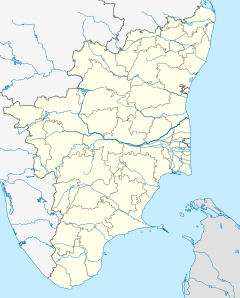Sivapuri Uchinathar Temple (also called Thirunelvayil) is a Hindu temple located at Sivapuri in Cuddalore district of Tamil Nadu, India. The place is also known as Thirunelvayil. The presiding deity is Shiva. He is called as Uchinathar. His consort is known as Uchinayagi.
| Uchinathar Temple | |
|---|---|
 | |
| Religion | |
| Affiliation | Hinduism |
| District | Cuddalore |
| Deity | Uchinathar (Shiva) and Uchinayagi (Parvati) |
| Location | |
| Location | Sivapuri Chidambaram |
| State | Tamil Nadu |
| Country | India |
Location in Tamil Nadu | |
| Geographic coordinates | 11°22′22.4″N 79°42′48.3″E / 11.372889°N 79.713417°E |
| Architecture | |
| Type | South Indian Architecture |
The presiding deity is revered in the 7th century Tamil Saiva canonical work, the Tevaram, written by Tamil saint poets known as the nayanmars and classified as Paadal Petra Sthalam. The temple complex covers an area of one acre and all its shrines are enclosed with concentric rectangular walls. The temple has a number of shrines, with those of Uchinathar and his consort Uchinayagi being the most prominent.
The temple has three daily rituals at various times from 6:00 a.m. to 8:30 p.m., and four yearly festivals on its calendar. Vaikasi Visagam during the Tamil month of Vaikasi (May - June) is the most prominent festival celebrated in the temple.
Legend
editAs per Hindu legend, the god Shiva and his consort Parvati appeared to the sage Agastya at this place (the same legend is attributed to several Shiva temples in Tamil Nadu). The place is called Thirunelvayil as it is believed that it was surrounded by fresh rice fields during the time (nel in Tamil indicates paddy grain). As per another legend, saint poet Sambandar, who was born in Sirkali, was fed by Parvati with divine milk. The child grew up and visited various temples and sung praised of god. At the age of twelve, his marriage was arranged to be held at Achalpuram. The marriage party visited the place on the way to Achalpuram. The party was hungry and on account of divine intervention, food was offered. Sambandar started praising Shiva as Uchinathar (Madhyaneeswarar in Sanskrit).[1] Periyapuranam, the 11th century compilation of the Nayanmars has details about Sambandar visiting the place after coming via Thillai Nataraja Temple and Thiruvetkalam.[2]
Architecture
editUchinathar temple is located in Sivapuri, a place 5 km (3.1 mi) from Chidambaram. The temple has a three tiered rajagopuram on the eastern side with concentric rectangular walls surrounding the temple. The sanctum is approached through a pillared hall called mukha mandapa and an artha mandapa. The shrine of the Ambal is located in the mukhamandapa facing south. The presiding deity in the form of lingam (an iconic form of Shiva) is located in the sanctum. It is believed that the image is self manifested. There is a panel on the wall behind the image that depicts the marriage of Shiva and Parvathi. There is a circumabulatory passage around the shrines. The pillars in the hall leading to the sanctum has sculpted images depicting various Hindu legends.[1] The temple tank called Kripasamudram is located opposite to the temple.[3] The temple was in dilapidated condition during the early part of 20th century and was rebuilt.[4]
Religious importance and festivals
editSambandar, an 8th-century Tamil Saivite saint poet, venerated Uchinathar in ten verses in Tevaram, compiled as the First Tirumurai. As the temple is revered in Tevaram, it is classified as Paadal Petra Sthalam, one of the 276 temples that find mention in the Saiva canon. The temple is counted as the third in the series of the temples on the northern bank of river Cauvery.[1]
The temple priests perform the puja (rituals) during festivals and on a daily basis. The temple rituals are performed three times a day; Kalasanthi at 8:00 a.m., Uchikalam at 12:00 a.m. and Sayarakshai at 6:00 p.m. Each ritual comprises four steps: abhisheka (sacred bath), alangaram (decoration), naivethanam (food offering) and deepa aradanai (waving of lamps) for Uchinathar and Uchinayagi.[1] There are weekly rituals like somavaram (Monday) and sukravaram (Friday), fortnightly rituals like pradosham, and monthly festivals like amavasai (new moon day), kiruthigai, pournami (full moon day) and sathurthi. Vaikasi Visagam during the Tamil month of Vaikasi (May - June) is the most important festival of the temple. Navratri during Purattasi and Karthikai somavaram are other festivals celebrated in the temple.[3][1]
References
edit- ^ a b c d e R., Dr. Vijayalakshmy (2001). An introduction to religion and Philosophy - Tévarám and Tivviyappirapantam (1st ed.). Chennai: International Institute of Tamil Studies. pp. 336–7.
- ^ S., Ponnuswamy (2015). Sekkizhar's Periya Puranam. Giri Trading Agency Private Limited. p. 152. ISBN 9788179506851.
- ^ a b "Sri Uchinathar temple". Dinamalar. 2014. Retrieved 14 May 2017.
- ^ Ayyar, P. V. Jagadisa (1993). South Indian Shrines: Illustrated (2nd ed.). New Delhi: Asian Educational Service. p. 244. ISBN 81-206-0151-3.
External links
edit- "Sri Uchinathar temple". Dinamalar.
- "Uchinatheswarar Temple, Tirunelvoyal". Shiva Temples of Tamilnadu, Paadal Petra Sivasthalangal.
